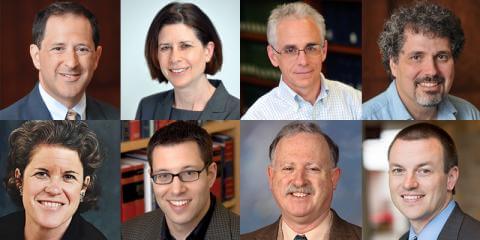UCLA Law Welcomes First Students in Its Master of Legal Studies Program
UCLA Law Magazine | Fall 2020 | Volume 43

CEOs, health care administrators, entertainment industry executives, journalists, nonprofit leaders and even a UCLA Bruin football defensive back are among the first 41 students to enter the new UCLA School of Law Master of Legal Studies program this year.
Opening doors to professionals who seek to master legal principles and advance their careers, the law school launched its new degree program in August, the first time in UCLA Law’s seven-decade history that it has offered a degree program for non-lawyers.
Students can design their own course of study or pursue one of eight specializations, including business law, employment and human resource law, entertainment and media law, environmental law, government and national security law, health care law and policy, law and technology, and public interest law.
Megan Perrin Johnson, vice president of human resources at STX Entertainment, says that she decided to enroll in the program to deepen her understanding of the workforce-related law and regulatory policy that is the focus of her team at STX.
“HR and employment and labor laws are always evolving and ever-changing, especially in California,” she says. “I view these changes not just as the forces that require us to update our policies but also as ways for our team to expand our knowledge. I hope to become a greater expert in my field and for my company through UCLA Law’s M.L.S. program.”
Like Johnson, 37% of UCLA Law’s first incoming class of M.L.S. students are vice presidents or chief executives of their organizations. Three out of five M.L.S. students have 10 or more years of professional experience. They range in age from 19 to 72, and 56% are women. Nearly half come from historically underrepresented backgrounds.
To help accommodate those with such busy schedules, the new program also allows students to earn their M.L.S. degrees in a single year of full-time classwork or in two to four years of part-time work; it is also the first part-time program in UCLA Law history, and 33 of the 41 students who began classes this year are attending part-time.
UCLA Law’s integrated program begins with specially designed courses that introduce M.L.S. students to legal principles, the contours of American law, an overview of the regulatory state and how to think like a lawyer. Then, M.L.S. students join J.D. candidates in advanced courses delving into specialized areas of law. The curriculum was designed by members of the UCLA Law faculty — experts in business law, negotiation, labor law, immigration and health care law — and is taught by full-time faculty members as well as practitioners with specialized expertise.
Twenty-two percent of the first cohort of M.L.S. students are specializing in employment and human resources law, and 15% are focused on entertainment and media law, an area in which UCLA Law is routinely ranked among the best in the country. Twelve percent of students are pursuing specializations in business law and in public interest law, respectively, two other fields in which UCLA Law is a nationally recognized leader.
Jason Fiske, executive director of the M.L.S. program, who designed executive programs at other law schools before joining UCLA in 2020, says that the program allows UCLA Law to serve a larger part of the professional community in Southern California, using the resources of a law school that has launched the success of 22,000 graduates, including game-changers in the legal profession, business, government, nonprofit work and entrepreneurship.
“From entertainment and aerospace to health care and the public sector, Los Angeles has a dynamic workforce that benefits from a deeper understanding of legal thinking and institutions,” Fiske says. “Our M.L.S. students are helping their employers, improving their own professional prospects and taking on a mid-career challenge that is personally rewarding and fulfilling.”
Christina Choy, a UC Berkeley graduate with a degree in sociology, is the director of marketing and communications at the Boys & Girls Clubs of the Los Angeles Harbor. She says that her goal in entering the M.L.S. program is to gain the skills that will create opportunities for the youth whom she serves.
“The voices of underrepresented and at-risk youth matter, and these youth need to be represented in greater numbers in higher education — and eventually in the corporate boardrooms — across the country,” Choy says. “By gaining a deeper understanding of legal and regulatory issues, I will be able to create more meaningful change in the lives of those who need us most and enable them to achieve their goals.”